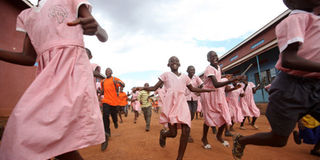Education is key to girls bright future

The International Day of the Girl-Child was marked on October 11, but why should we bother about it? This day is dedicated to celebrate the steps that have been taken to ensure that the welfare of the girl-child is well for their good. Traditionally, girls around the world have been disadvantaged because they are young, but also because their gender is female. Our society considers their voices as second best., meaning they must fight against the odds and double efforts in order to be among the big achievers.
Therefore, we use the day of the girl-child to emphasise the potential and power of girls in our not-so-easy world today. First is to remind parents about the importance of bringing education to all the girls under their care. In a family, the future of the girls could even be brighter than for the boys. Education is the master key, as was said by singer Lucky Dube, in empowering the girl to make them good citizens. Education helps remove the obstacles that the girl faces. It goes the last mile in ensuring that girls’ vulnerabilities are addressed.
So we have to run that last mile in order to arrive. Deliberately take special steps to address the immediate needs of the girls. So we bother about this day; to remind our old-fashioned parents that educating their girl-children is the right key. Education mitigates poverty and improves the life of the girl. We know that worldwide, girls are less likely to go to school compared to the boys. Official reports provide that more than 130 million girls between six and 17 around the world do not go to school. And of this, 15 million are of primary school going age, over half of which live in sub-Saharan Africa and cannot read and write. Sadly, 31 million children do not live in their homes because of conflict and violence.
Yet of these, a significant population of the girls have been displaced as a result of natural disasters. And there are those girls that face various cultural hurdles.
Among the cultural and socio-economic events playing badly in their lives include the perceived value of girls. They are less valued than the boys. The other challenges are poverty, harmful cultural practices, for instance, female genital mutilation, and child marriages.
About 12 million young girls get married every year before they are 18 and so are more likely to drop out of school. We also have gender-based violence, violence at water collection points, child trafficking, and child sacrifice. In some communities, the location of schools is so far away that it makes daily commuting a risk for girls. So they remain at home. Whereas the boy is provided with everything they need to get education, the girl is made to wait until their brothers have had everything. Educating girls is seen by many African parents as a waste of time and money.
So on the International Day of the Girl-Child, we celebrate the girls’ right to equal basic needs, with education being at the top. The girl need to enjoy the same opportunities as the boy. We believe that if the girl is given education, she will contribute immensely to reducing poverty.
On top of education, the girl learns the things that give her good standing in the society and the world.
She learns essential social and emotional skills to enable them relate well with the world around them. And they can navigate the various stages of life with distinction to enable her adapt to different life situations.
Simon J. Mone,
[email protected]




